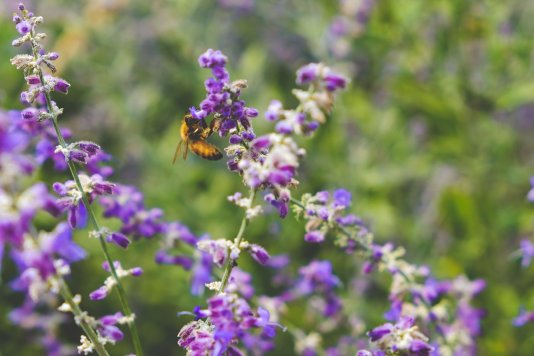- About
- Topics
- Picks
- Audio
- Story
- In-Depth
- Opinion
- News
- Donate
-
Signup for our newsletterOur Editors' Best Picks.Send
Read, Debate: Engage.

Biodiversity is on a path of unprecedented decline with more than 1 million species at risk of extinction. This will likely increase as the impacts of climate change grow. Yet, solutions exist to protect and restore biodiversity that can also benefit people, jobs and the environment while bolstering resilience to climate change.
Practices that protect and improve the management, health and productivity of natural resources on land and water - referred to as nature-based climate solutions - can help limit global average temperature increases to well below 2°C.
At the same time, they enhance soil health, clean air and water and sustain biodiversity in ways that provide clear benefits to people.
Studies show a positive correlation between biodiversity and better health; for instance, children living near protected areas like national parks are healthier than those living farther away. Moreover, in low- and middle-income countries, children living near forested areas have higher dietary diversity than their counterparts in other areas.
Conversely, as forests are cleared or degraded, local people must spend more time finding food and fuelwood in the forest, which can negatively impact their health.
For example, the Gorongosa region in Mozambique experienced civil war and conflict for decades, devastating people, wildlife and natural ecosystems. Since 2008, the Gorongosa project has collaborated with the government of Mozambique to revive and conserve Gorongosa National Park, reduce conflict in the region and sustainably unlock the park’s economic potential as a driver for human development in nearby communities.
"Solutions exist to protect and restore biodiversity that can also benefit people, jobs and the environment."
Since the programme’s onset, wildlife poaching incidence has decreased by 72 percent and wildlife populations - including several endangered species - have increased. Youth have enhanced their skills in environmental education, eco-tourism and conservation. More than 11,000 farmers have increased crop yields due to better farming practices.
The new forestry and climate action programme in Gorongosa protects and restores forests and plans to seek carbon offset certification. The project’s success has led to an extension of the public-private partnership for another 25 years, demonstrating that Gorongosa can be a regional model for alleviating poverty and improving human well-being while conserving biodiversity.
Meanwhile, in western Tanzania, Lake Tanganyika and the adjacent forested mountains are home to 250 cichlid species found nowhere else in the world and also home to more than 90 percent of Tanzania’s endangered chimpanzees.
More than 500,000 people depend on farming and fishing within the 2 million–hectare landscape. Yet, they face challenges around health and government services due to their remote locatio, and the impacts of climate change.
The Tuungane Project was launched in 2012 to help address these issues in a holistic way. Together, local people, government and NGO partners have collaborated to develop community-led initiatives that sustain families, fisheries and forests.
Modeling healthy and sustainable behaviors, establishing local microfinance banks and carbon credits and boosting reproductive health and girls’ education have improved health and diversified income. In addition, enacting sustainable fishing and climate-smart agricultural practices and protecting vital forest habitat for endangered chimpanzees is transforming lives and boosting resilience to climate change.
More than 12,000 farmers have doubled their maize yields since adopting conservation-smart agricultural practices, reducing pressure on chimpanzee habitats and improving water quality in the lake. Newly established community-managed fish reserves and fisher-enforced sustainable fisheries laws help ensure improved food security and income for local communities.
Rural communities across the African continent face many challenges to sustainable livelihoods and biodiversity conservation due to climate change. Yet they are also innovative, resilient and ready to embrace interventions that generate wide ranging benefits for their families and communities.
Addressing climate change in ways that simultaneously improve the well-being of rural people experiencing extreme poverty can yield substantial socioeconomic, health, equity and ecological gains.
The world does not have to choose between biodiversity conservation, sustainable development, climate mitigation and climate adaptation. Win-win solutions are at hand that can help the world meet the goal raised at the UN COP15 biodiversity talks of protecting at least 30 percent of the planet’s land and water by 2030 while addressing climate change, supporting Indigenous Peoples and local communities, and alleviating poverty.
Kristen P. Patterson is an innovative leader, speaker, and writer focused on finding equitable solutions to global challenges that improve people’s lives. As the inaugural Director of Drawdown Lift, Kristen leads efforts to advance climate solutions that also boost human well-being and alleviate poverty.
Image by Scotty Turner.